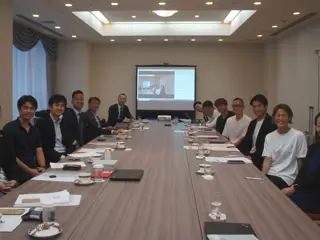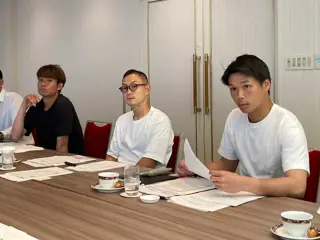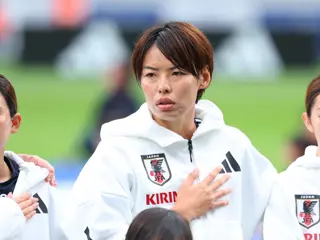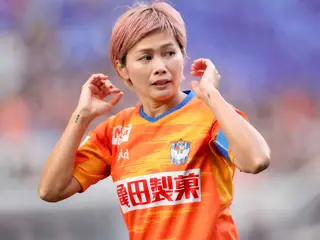News
Player-driven JPFA looking to build on impressive progress
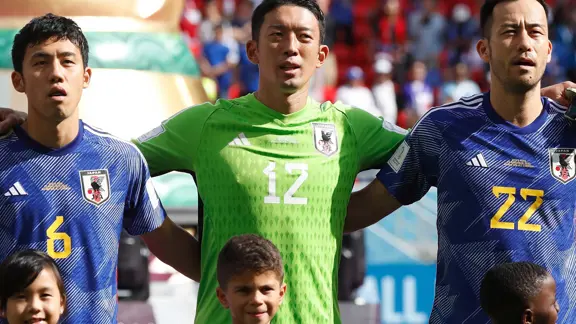
Introducing a minimum salary, removing an arbitrary salary cap for first-year players, and bringing footballers to the negotiating table with the league are just a few of the Japan Pro-Footballers Association’s achievements since new leadership arrived in 2022.
Taisuke Matsumoto, a sport law professor at Waseda University with over 20 years' experience as a sport lawyer, assumed the role of JPFA Executive Director in November 2022, having previously been involved with the union as a legal advisor.
Matsumoto's arrival came months after Maya Yoshida, a titan of Japanese football, became the union’s president in June 2022, the same year in which he last played international football having amassed over 120 appearances. The former national team captain – currently at LA Galaxy after stints in the Premier League, Bundesliga and Serie A – is flanked on a player board with Liverpool’s Endo Wataru and former Japan goalkeeper Shuichi Gonda.
"Maya has a strong desire to contribute to Japanese football," Matsumoto told FIFPRO. "Even though he’s no longer playing at international level, he still has a big influence over the national team."
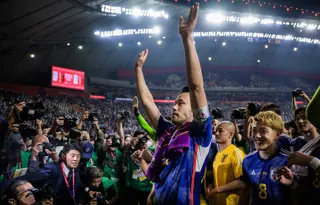
JPFA membership is nearly 2,000 strong: 1,700 players hail from the top three men’s divisions and 200 from the Women Empowerment League (WE League), not to mention around 70 overseas men’s and women’s national team players.
Though it’s been 15 years since Yoshida last played in the J.League, before embarking on his journey to La Galaxy via VVV-Venlo, Southampton, Sampdoria and Schalke, he has never forgotten his roots.
"As you can imagine, the needs of players are very different depending on which division they play in, whether they’re in the national team, or whether they're based domestically or overseas," said Matsumoto. "Maya, though, is not just focused on a specific group and is passionate about delivering for all levels. He is also passionate about the future generation and how we can positively impact them."
Putting players in the driving seat
Using their influence to create a better future for Japanese players was evident when JPFA played an integral role in helping move the dates of the J.League season – a timeline which had not changed in 30 years – for it be more aligned with leagues around the world.
2025 will be the final season where Japan's league campaign will run from February to December; it will soon be adapted to run from September to May.
"It was common in the past in Japanese football for the league or federation to make unilateral decisions without involving players," explained Matsumoto. "In the case of moving the league dates, though, the players were involved as one of the key stakeholders.
"One of our core philosophies is that players shape the future of Japanese football. We engage with our player board once a month, meaning they’re up-to-date and feel better equipped to speak up during those formal meetings with stakeholders.
"Players are starting to see JPFA as a platform where they can achieve things they want to achieve."
The union spoke to players from all 60 clubs to get direct feedback. The reason for changing the J.League timeline was primarily two-fold: climate and unlocking business opportunities.
Matsumoto said: "Summer in Japan is becoming dangerously hot for players, so the intensity of games will increase with footballers playing in more favourable conditions.
"And with the league soon to be aligned with the European season, when it comes to player transfers to overseas leagues, it means potentially there will be more money coming into the J.League – it's a positive from a business perspective."
One of the biggest challenges facing the union in 2025 is players' image rights. "Contrary to what's happening in Europe or USA, in Japan image rights are controlled by the clubs and the league – meaning players don't have the freedom to manage their own image rights. That’s something JPFA board members are aiming to tackle this year."
Has women’s football regressed in Japan?
In 2011, Japan were Women’s World Cup champions. Fast forward 14 years and the Nadeshiko are not the force they once were on the global stage with USA and European nations dominating podium finishes at the last two World Cup editions.
Having only kicked off in September 2021, the WE League is embryonic compared to the likes of the NWSL, A-League Women and Europe’s elite leagues. While the league is a step in the right direction, it has not been without serious challenges.
"After three years, most of the clubs are still not financially independent or sustainable. There's also still a mix of professional and amateur players and many still need to have another job outside of football to support themselves financially, yet clubs expect those amateur players to act like professionals."
Prominent players involved in Japan’s 2011 World Cup triumph are active members of JPFA. Former World 11 winner Aya Miyama founded the union’s women’s department, while the likes of Yukari Kinga, Nahomi Kawasumi and Saki Kumagai – the scorer of the penalty kick that won the World Cup – are leading voices.
"They see the reality of women's football today in Japan, that it hasn't developed that much, and so they feel the need to be part of this movement. They want to ensure women's football in Japan is financially stable."
Matsumoto continued: "A recent leadership change now sees the WE League and J.League share the same chairperson, meaning the women’s league in theory is able to get more human resources and financial support from the men’s league."
Continental influence
Japan will play host to FIFPRO’s Division Asia/Oceania general assembly in June 2025. It provides an opportunity for the division to align on their 2023-2026 strategic framework, build on the player-centric research undertaken in recent times, and look ahead to the future of football in the region.
"One of the benefits of this division is learning what other countries are doing better and then putting it into practice," explained Matsumoto. "On the back of the findings from the men’s and women’s AFC Champions League, for example, we saw how PFA Australia assisted in the distribution of prize money, and we’ve now been able to go to all the clubs in the J.League and WE League that participated to negotiate prize money and ensure players get their fair share.
"There are still many underlying issues in the region, such as the AFC Champions League conditions and how World Cup qualifiers are generally conducted in Asia, so it's important members continue to work together to address the governance and operations of the AFC in order to improve the current situation.
"There are also still a lot of improvements to be made with women's football especially. Gender equality and equity is pretty much accepted in Europe and USA, for example, but that’s still not the case in Asia. We believe women's football can be a tool to drive those social changes."

